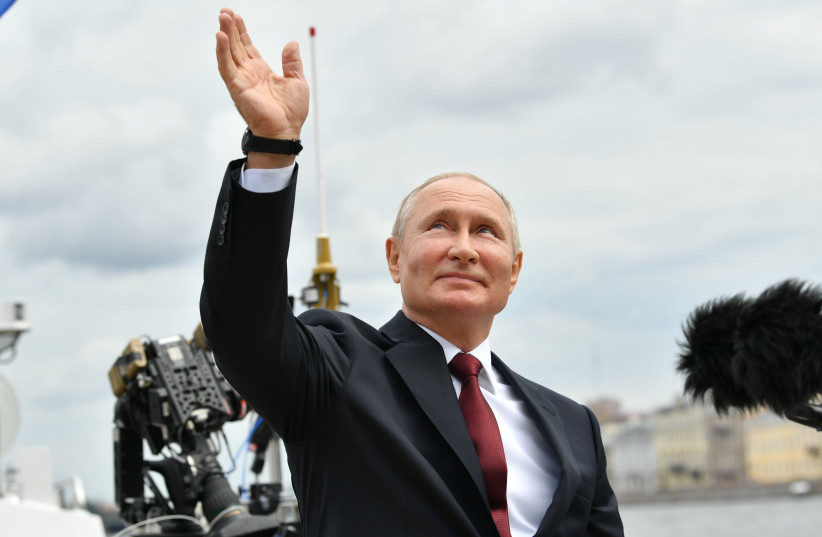Amid the acceleration of events and the world’s preoccupation with following what is happening in Afghanistan since the Taliban took control of the capital, Kabul, there are signs that the observer cannot overlook. This is not just because they involve important international parties, such as Russia.
But they can also predict major geopolitical changes in the strategic landscape in the coming period. Russia, for Afghanistan and Afghans, is not just another international force, as is well known, given the legacy of Soviet intervention in that country.
But Russia, the rightful heir to the former Soviet Union, pursues a pragmatic foreign policy that leaves no room for ideologies. Russian President Vladimir Putin deals on the basis of Russian strategic interests wherever they may be. Therefore, the signs and conciliatory tone exchanged between Russia and the Afghan Taliban do not seem out of context.
If Putin’s Russia can converge and even ally with those it considered enemies yesterday, the fact that the Taliban show so much respect, appreciation, and friendliness toward Russia also reflects important things related to the movement’s foreign policy directions in the coming period.
Russia has for some time appointed a presidential special envoy to Afghanistan, Zamir Kabulov, who is director of the Russian Foreign Ministry’s Second Asian Department. His role has been strongly asserted recently in managing his country’s relations with Afghanistan in the post-US withdrawal period.

Many prominent positions have emerged, including his assertion that Russia does not need advice from abroad on what to do in Afghanistan. This position is a response to US President Joe Biden’s statement regarding a possible American appeal to other countries, including Russia, to support Afghanistan.
“We don’t need advice from outside on what to do,” Kabulov said. Decisions on this issue are made by the Russian leadership. “This aid (for Afghanistan) is currently being provided. Everyone knows that.”
Russia intends to manage its relations with the Taliban by isolating itself from the US. There is also an important statement made by Kabulov on the Russian Channel 1 program: “We see no direct threat to our allies in Central Asia (by the Taliban). There is not even a single fact that suggests otherwise,” he said, noting that “Russia has an established base and contacts with the Taliban.”
“We have been in contact with the Taliban for a long time,” he said. “The fact is that we have already prepared the basis for talks with the new authorities, this is an asset of Russian foreign policy that we are using fully for the long-term benefit of Russia.”
These important statements are linked to another statement by Kabulov in which he expressed Moscow’s optimism about Russia-Afghanistan relations after the change of power in Afghanistan, saying, “This is not only my hope. We are confident about this.
We will build our relations on the basis of the balance of the results of our work in recent years,” he said, revealing his ongoing contacts with Mullah Abdul Ghani Baradar, head of the Taliban’s Doha-based political bureau.
Reading the Russian reactions, one can build conclusions that Afghanistan’s neighbors, including Russia and China, have long understood that the US plans to leave Afghanistan and export the country’s crises to neighboring countries.
The last two decades have been marked by a major strategic mistake by the US, that of carrying the heavy burden of controlling the situation on the ground with all the human, material, military and political costs that entails.
American withdrawal means leaving a thorn in the side for Afghanistan’s neighbors, especially those with controversial records. In theory, the Taliban remains ideologically at odds with the Shi’ite Iranian regime. There is an old legacy with Russia since the Soviet occupation. There is a Chinese vision of a strict religious system on its borders.
So it is clear that Russia has been planning to deal with the current situation in Afghanistan for some time, given the priority of the counterterrorism issue in its foreign policy, its commitment to ensuring the security of neighboring countries with which it has a collective security agreement, and Russia’s realization that ISIS, based in some of the northern states of Afghanistan, is more dangerous to those countries than the movement.
Within the first few hours of entering Kabul, he secured the Russian embassy in Kabul, which led the ambassador to say that the Russian embassy building was heavily guarded by Taliban fighters. He praised their performance and concern for the safety of the Russian embassy staff in their capital.
“Currently, the embassy is guarded by a large number of Taliban fighters. They have left a very good impression, reasonable and well-armed men who have imposed a tight cordon around the building so that no terrorist or fool can infiltrate us.”
In short, Russia may have realized that the US intends to make the Taliban a thorn in Russia-China relations. It has accelerated its strong relations with it, as has China and other countries. Thus, we may see an international and regional geopolitical struggle raging to win the Taliban’s friendliness in the coming period.
The author is a UAE political analyst and former Federal National Council candidate.
